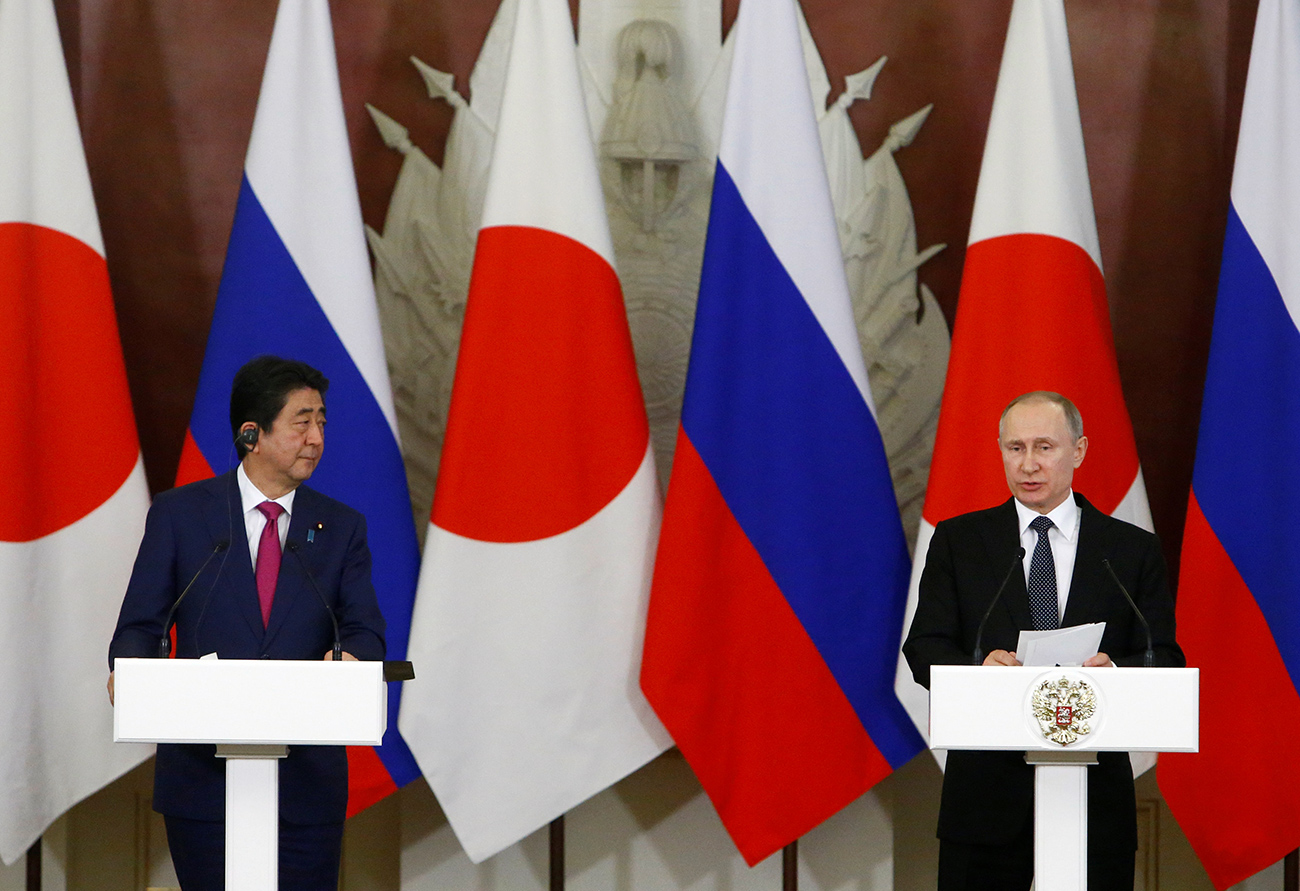
Russian President Vladimir Putin and Japanese Prime Minister Shinzo Abe attend a media briefing following their meeting at the Kremlin.
ReutersOn April 27 Japanese Prime Minister Shinzo Abe returned to Moscow four years after his first spearheading visit and had the most ‘business as usual’ of bilateral summits with President Vladimir Putin to date.
The leaders of Japan and Russia met in the Kremlin for their 17th bilateral meeting since April 2013.
Journalists usually leave it to political scientists or historians to count the frequency with which such summits occur, say, between the top brass of Russia and China, or China and Japan.
In the case of Putin and Abe, however, stressing the number of meetings has become a regular feature of media reports and perhaps hints at the fact that the attempted normalization is still a process in the making.
The latest Putin-Abe meeting in Moscow was perhaps the most unnoticed of high-level talks, especially when compared to the hype of the 2016 summitry in Sochi, Vladivostok and Nagato, which was full of appealing promises.
This time the parties did not trumpet any grand designs but managed to follow through on practical projects that transpired during prior talks at the ministerial level.
29 memorandums of understanding (MoUs) were signed, demonstrating that both governments are committed to maintaining their “deal pipeline” up and running – even if not all the MoUs reach a fully-fledged implementation stage later on.
The projects in question included fisheries near the disputed Southern Kuril Islands, cooperation over energy, resource exploration, pharmaceuticals, healthcare, and ecotourism. The extent of practical cooperation can be further specified by a joint public-private feasibility study team to be dispatched to the Kurils as early as May.
As forecasted previously, one significant and tangible humanitarian achievement the Japanese leader took away from Moscow was the pledge to launch visa-free air travel for the former Japanese inhabitants of the Southern Kurils in June 2017.
Previously, in order to visit family graves, the Japanese deportees, most of who live in Hokkaido, had to travel by sea.
Apart from its importance for the former residents and related political mileage for Abe, this agreement is significant in that it maintains and highlights the human dimension on the Russo-Japanese agenda that would be otherwise dominated by pragmatic and economic matters.
Since the April meeting was already penned as a follow-up during the December 2016 summit, it hardly envisaged the prominence of the North Korean missile program on a predominantly bilateral agenda.
Yet Pyongyang’s latest ventures into brinkmanship not only revived a nightmare scenario of an armed conflict in the middle of Northeast Asia, but also created an opportunity for Russia and Japan to step up their profile in the region’s multilateral diplomacy – even though Tokyo’s stance towards Pyongyang is currently harsher than Moscow’s.
However, despite Russia’s declared willingness to resuscitate the six-party talks’ mechanism and Japan’s encouragement thereof, these attempts ultimately depend on the success of cajoling and coercing Pyongyang into resuming these negotiations, which hardly appears realistic at this stage – at the very least, until the next election in Seoul.
Furthermore, discussing the situation on the Korean peninsula provided a way for the Russian and Japanese leaders to digress from the pressure of making slow progress on the territorial dispute, as the international environment for Russia has gradually become reminiscent of the times before the last U.S. presidential election.
Rewinding to the period preceding November 2016, one might recall that the Abe cabinet’s drive to expedite the normalization of ties with Russia was then additionally spurred by the expectation of continued isolation of Russia by the United States in the event of Hillary Clinton’s victory and ensuing weakening of Moscow’s bargaining power.
The immediate aftermath of Donald Trump’s arrival in the White House appeared to have shattered this “modeling scenario”.
However, the new American president’s first 100 days showed that tensions between Washington and Moscow persisted despite the departure of his predecessor Barack Obama, while the U.S.-Japan and U.S.-China relationships have not yet soured, also contrary to initial expectations.
Consequently, Japan’s potential role as Russia’s best friend among the G7 nations was seemingly bound to fade in the end of last year but came back in style, following newly-traded barbs between the Kremlin and the White House over Syria.
Curiously, what initially appeared as Abe’s standalone trip to Russia was subsequently expanded into a regional tour with the addition of four Nordic countries and the UK.
All of these countries are traditionally important partners of Japan in Europe and the maximization of European destinations makes the most out of a long trip from East Asia.
Yet, one might also suspect that this time Abe wanted to avoid appearing too cozy or overselling to Putin by travelling to Russia alone, which increased the motivation for sidekick trips.
If this is the case, it is possible that Tokyo’s fervor in publicly cajoling Moscow may become less vigorous and more low-key in order to test the Kremlin’s bargaining power after the non-eventuated U.S.-Russian normalization under Trump.
It will be clearer then to what extent the ongoing build-up in Russo-Japanese economic cooperation projects is viable without top-down political support.
The next time Abe and Putin will touch base will be on the margins of the July G20 summit in Hamburg and during the Eastern Economic Forum in Vladivostok in September.
The writer is a doctoral candidate, at the faculty of Asian and Middle Eastern Studies, St. Catharine's College, University of Cambridge. He has been active in projects involving academics in Japan, Kazakhstan, Uzbekistan and Azerbaijan. Views expressed are personal.
If using any of Russia Beyond's content, partly or in full, always provide an active hyperlink to the original material.
Subscribe
to our newsletter!
Get the week's best stories straight to your inbox